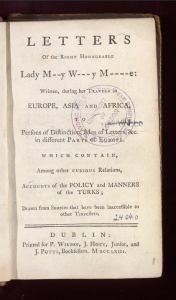Liberating the Collections 2022: A Volunteer’s Experience of Searching UCL Special Collections
By Erika Delbecque, on 23 August 2022
This guest blog post was written by Jane McChrystal , who spent five months volunteering at UCL Special Collections as part of the Liberating the Collections project.
In March I was presented with an exciting opportunity – discovering the work of women authors published before 1750, held by UCL Library’s Special Collections. I’d been invited to join a team of volunteers for the library’s Liberating the Collections project, by Head of Rare books, Erika Delbecque. Next, Erika convened an online meeting to introduce volunteers to each other and some members of the library team. During the meeting the librarians showed us how to identify works catalogued in the Special Collections using the Explore service, knowledge which could then be applied to the pursuit of the individual projects Erika had assigned.
There were some initial qualms- what if there weren’t any works by women authors pre 1750 in UCL’s collections, or I couldn’t work out how to find them? Luckily, my supervisor, Jo Baines, Academic Liaison Librarian / Archivist, was at hand to reassure me that there were, as I’d hoped, many different ways of approaching the collections to find relevant texts, so it was fine, at this stage to try out a variety of search methods and see what worked.
Initially, I set out in quite a random fashion. I didn’t make much headway, but I was able familiarise myself with Explore and become more confident about finding my way round the collections. And then, Covid struck in April, leaving me quite foggy for a number of weeks.
Once the fog lifted, something had become clear, I needed a system. A simple idea occurred to me. How about approaching my searches with a list of women authors who lived between the 14th and 18th centuries? In this instance, Wikipedia was my friend and it helped me to compile a list of 353 authors. I then selected some who looked the most promising and noted the subjects they addressed, and the literary forms they employed, such as poetry, meditations or drama. Consequently, I was able to match the authors with the collections they were most likely to be found in and the carry out a simple author search in the catalogue of the relevant collections.

The title page of
Letters of the Right Honourable Lady M-y W–y M–e by
Mary Wortley Montagu (Dublin : Printed for P. Wilson, J. Hoey, Junior, and J. Potts, 1763). [SSEES Library, Rare Books Room, KMisc51]
Before my search, though, I wasn’t aware of her four other dramas and poetry, mainly composed of paeons of praise to various illustrious individuals and members of royalty. I really knew very little about this literary form, but as I went ahead with further searches, I came to realise how popular it was, which makes sense when you consider the important role of patrons in literary life at the time.
And then I came across a gem in the Rotton collection, a collection of Lady Mary Wortley Montagu’s letters to various eminent men in England, concerning her travels in Europe, Africa and Asia with her husband, a British ambassador, which lists the name “Mary Astell” among its contributors.
Mary Astell (1666-1731), sometimes referred to as England’s first feminist, was the author of A Serious Proposal to the Ladies for the Advancement of their True and Greatest Interest, a Lockean philosopher and the founder of a charity school for girls in Chelsea.
She also belonged to a circle of scholarly women in Chelsea, which included Lady Mary Chudleigh, Elizabeth Thomas and Elizabeth Elstob and Wortley Montagu. Each lived in quite different circumstances, ranging from the wealthy, aristocratic Wortley Montagu to Astell.
Astell was a single woman, whose family had fallen on hard times and, as such, had no prospect of marriage to a social equal. She survived on the patronage of women, like those in the circle, who shared her interests in feminism, the oppressive nature of marital relations and the importance of a good education for girls and women.
I returned to the catalogue in search of their names and found four other works by Montagu in the Rotton Collection, largely made up of more letters about her experiences in the different countries she lived in. It is fortunate that these letters were preserved in the eminent men’s libraries and published after their estates were distributed. These texts were then picked up by collectors who donated them to UCL Library.
So, what next? On 24th August I look forward to sharing my discoveries at a meeting of UCL Library’s Rare Books Club, where participants will have a chance to take a look at some of the texts I found and learn about the work of two fascinating women authors previously buried in the Special Collections, together with the stories of some other important women in their orbit.
All in all, these experiences of taking part in Liberating the Collections have lived up to every expectation I set out with and beyond. Working with Jo as my supervisor has been one of the most enjoyable of them and, thanks to her knowledge, flexible approach and supportive attitude, I found a path to these heroines.
 Close
Close


